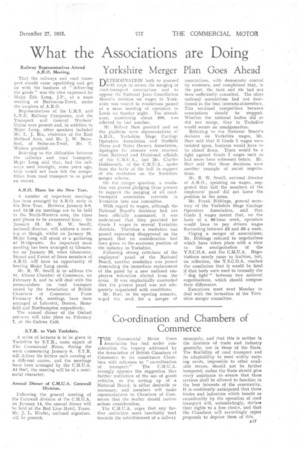Yorkshire Merger Plan Goes Ahead
Page 23

If you've noticed an error in this article please click here to report it so we can fix it.
DETERMINATION both to proceed with steps to secure the merging of road-transport associations and to oppose the National Joint Conciliation Board's decision on wages in Yorkshire was voiced in resoCutions passed at a mass meeting of operators in Leeds on Sunday night. The 'attendance, numbering about 500, was affected by had weather.
Mr. Robert Barr presided and on the platform were representatives of A.R.O., Yorkshire Stage Carriage Operators Association and Sheffield Horse and Motor Owners Association. Apologies for absence were received from National and Divisional officials of the C.M.U.A., but Mr. Charles Holdsworth, of the, C.M.U.A., spoke from the body of the hall in support of the re.solution on the Yorkshire merger scheme, On the merger question, a resolution was passed pledging those present to support the merging of all road'transport association interests in Yorkshire into one committee.
With regard to wagese although the National Board's decisions had not been officially • announced, it was understood that they provided for Grade_ I wages in several Yorkshire districts. Therefore a resolution was passed expressing disapproval on the ground that no consideration had been given to the economic position of the industry in Yorkshire,
• Following strong criticisms of the employers' panel of the National Board, another resolution was passed demanding the immediate replacement of the panel by a new national employers federation elected from the areas. It was emphatically contended that the present panel was not adequately acquainted with conditions. Mr. Barr, in his opening remarks, urged the need, for a merger of associations, with 'democratic control by members, and complained that, in the past, the rank and file had not been sufficiently consulted. The older national associations had not functioned in the best interests of members. This sectional competition between associations should be stopped. Whether the national bodies did or did not merge, they in Yorkshire would secure an amalgamation.
Referring to the National Board's decision on Yorkshire wages, Mr. Barr said that if Grade I wages were insisted upon, business would have to be closed down. There would he a fight against Grade I wages such as had never been witnessed before. Mr. Barr said that these decisions were another example of secret negotiations.
Mr.. R. W. Sewill, national director of A.R.O., speaking on wages, suggested that half the members of the employers' panel did not know the position .in the areas.
Mr. Frank Bibbings, general secretary of' the Yorkshire Stage .Carriage Operators Association, said that Grade wages Meant that, on the basis Of a 66-hour. week, operators would have to pay drivers wages fluctuating between £5 and ga a week.
Urging a merger :of associa.tions;. Mr.. Bibbings referred to negotiations which have taken place. with a view to the amaIg,amaticin of the Y.S.C.O.A. and the C.M.U.A. Negotiations nearly came to fruition, but, on reflection, the Y.S.C.O.A. reached the conclusion that it would be fatal if that body were used to intensify the " dog fight " between two national organizations, which should compose their differences.
Executives meet next Monday to deal with the formation of the Yorkshire merger committee.












































































